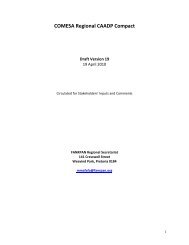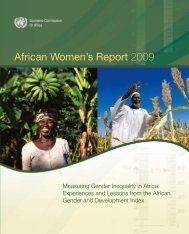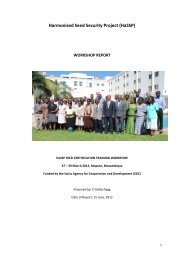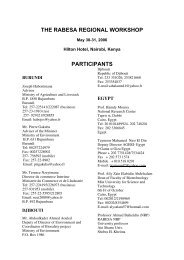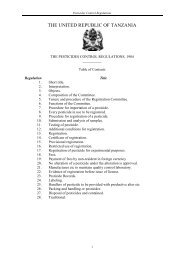Community-driven development decision tools for rural - IFAD
Community-driven development decision tools for rural - IFAD
Community-driven development decision tools for rural - IFAD
- No tags were found...
You also want an ePaper? Increase the reach of your titles
YUMPU automatically turns print PDFs into web optimized ePapers that Google loves.
Control ex ante vs. control ex post on using public fundsThe normal practice under which public funds are transferred to non-governmental agents isthrough contracts that obligate the agent to per<strong>for</strong>m an activity (e.g. delivering goods andservices) in exchange <strong>for</strong> a cash payment. These contracts entail detailed ex ante control over theuse of the public funds committed under the contract. Each item that the agent is authorized toincur with the funds is specified in the budget and must be approved be<strong>for</strong>e any expenditure.Further assurance of budget compliance is exercised at the time the funds are released and at theend of the contract by auditing the accounts.A very different procedure is used in the case of credit projects. In these, the financialinstitution entrusted by the government to make loans to eligible clients is trusted to operate inaccordance with principles agreed to by the financiers (e.g. <strong>IFAD</strong> and the government) and no exante approval of the lending agent’s individual transactions is requested. The external agency andthe government retain the right to inspect the lending institution’s operations, exercising an expost control over the use of the public funds. In these cases, the application of ex post controlover the use of public funds is due to the nature of the business (i.e. it is impossible to plan allthe individual lending operations in an Annual Work Plan and Budget [AWP&B]) and to thenature and purpose of the receiver of the funds. Financial institutions are selected preciselybecause of their capacity to decide on their own about their lending programme; they are theultimate judge of the clients’ creditworthiness and the viability of the clients’ projects.The general principles used by financial institutions have been used to finance CBO projectsthrough CSOs of public utility. Funds are committed to the CSOs based on the ex ante approvalof their investment plan. After the first installment of the annual budget is released as a lumpsum to a CSO, close ex post control is maintained to ensure that funds are applied to individualCBO projects that are consistent with the plan and that they use proper procedures <strong>for</strong>procurement and payment of suppliers.<strong>IFAD</strong>’s PLPR project in Cape Verde supported the government’s innovative legislation to encouragethe <strong>development</strong> of CSOs of public utility in the fight against poverty. The legislation envisages• investment criteria (e.g. ceilings on the total cost and on the cost per beneficiary of thecommunity microprojects eligible <strong>for</strong> funding by the CSO);• the CSO’s commitment to verify the technical viability of the microprojects, the certificationsources of their design and procurement practices;• the CSO’s autonomous <strong>decision</strong>-making in planning and budgeting;• detailed ex post control over the use of funds transferred to the CSO <strong>for</strong> every microproject.The CSOs must comply with <strong>IFAD</strong> and government accounting and financial reportingprocedures. Their detailed annual budget remains subject to inspection by the central authoritiesafter the first installment of the annual budget is disbursed to them. The inspection verifies thatthe detailed allocation of funds to microprojects is in accordance with the approved indicativeplan, that the investment criteria are respected and that the agreed procedures <strong>for</strong>implementation of the microprojects (e.g. design, procurement) have been followed. Failure tocomply results in immediate suspension of financial support, affecting the entire investmentprogramme, not just the subproject that may be in default. This creates strong pressure <strong>for</strong> all theCBOs to respect the criteria.The system allows maximum flexibility compatible with adequate controls. <strong>Community</strong>projects can be implemented as they become ready <strong>for</strong> funding during the financial year.Government inspection takes place twice during the financial year and the CSO accounts areaudited by private accountants immediately after the financial year closing. In principle,submitting audited accounts from the previous year should be a condition <strong>for</strong> releasing thesecond installment of the current year’s budget.76



